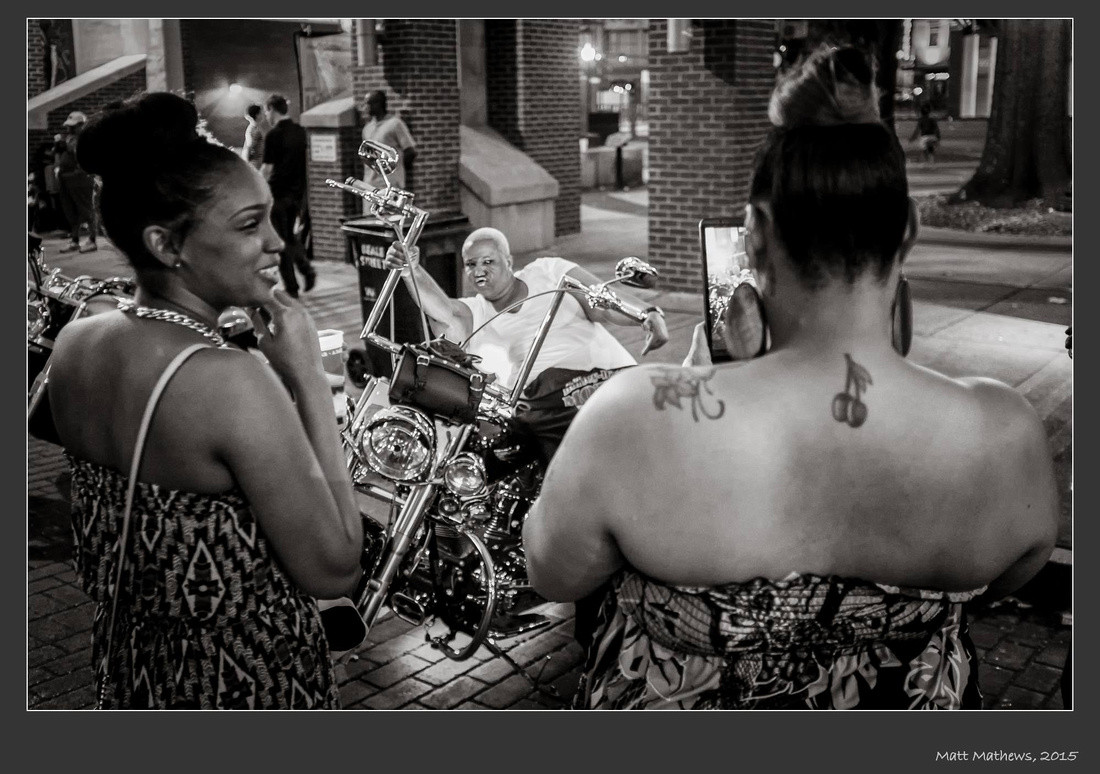Reflections on Black Women, Funk, and Beale Street
Funk on Beale Street, 2015
I will never understand what it means to be a black woman in America, at least not fully. And I am not alone. But this fact does not exempt me from the obligation to try. Nor does it mean that I cannot come to understand at least something about it if I try really hard.
In Shoes That Fit Our Feet: Sources for a Constructive Black Theology (Orbis, 1999), Dwight Hopkins explores two polarities that exert a powerful influence on the lives of many African-American women. Borrowing from the colloquial discourse of black women, Hopkins names these polarities thing and funk.
Thing names all the forces of American culture that conspire to objectify black women, that work to erase their humanity and render them invisible except when we need them present to be exploited economically, sexually, and culturally. Thing happens when the ideology of whiteness constructs a black woman's identity into an over-sexed exotic other, a welfare queen, or a asexual Aunt Jemima whose nannying is as simple and sweet as tasty syrup on pancakes. Thing happens when we are unable or unwilling to see the myriad of successful black women who disrupt these cultural constructions. And thing happens when we explain away the success of such women as exceptional and thus anomalous, forgetting their names even as we make them "a credit to their race."
It's easy to internalize thing's lie. Toni Morrison and Alice Walker have taught us as much in The Bluest Eye and The Color Purple. The internalized lie shows itself in guilt, self-doubt, and a sense of defilement that wear away at the bodies and souls of black women. A healthy sense of one's worthiness and an appropriate love of self are paralyzed by the venom of shame and a sense of powerlessness.
Funk is hard for white people like me to understand. It seems so loud, so boistorous, and, well, just so black. It makes us uncomfortable. It does so because it protests and resists the stranglehold of our whiteness. Funk erupts in gesture, dialect, slang, art, and in the occasional wagging of a black women's finger at a condescending clerk, nurse, or theologian. Its roots are deep, reaching back to "sassing" the master on the plantation. It was and is resistance to thing. It is a stubborn insistence on somebodyness; a refusal to conform to white expectations for black being. It is soul. It is agency. It is an assertion of her genuine self over against the false constructions of her identity as welfare queen, over-sexed exotic other, and benign nanny. Funk is gospel, grace, and judgment wrapped into one.
But funk is protest in the form of a zesty celebration of life. It celebrates embodiment and soulful sexuality, redeeming them from white fantasy, fear, and violence. It celebrates slang, gesture, and rhythm, offering redemption from "respectable" speech and the politics of respectability required by thing.
Funk is fun. Funk is playful. Funk is parody. Funk piles atop male motorcycles and strikes an overdone, playful pose of parodied seduction and satirized femininity that unmasks the absurdity of our dangerous cultural myths. It's the exuberant, unpoliced celebration of the whole self as it triumphs over thing. If thing is death, funk is life.
Hopkins has helped me understand a thing or two about the experience of many African-American women. I don't fully understand, of course. And, if I'm honest, funk still sometimes makes me squirm a little. It's difficult to confront my complicity in thing as an upper middle class white man. It's much easier to deny thing's existence, insisting on the tired tropes of the importance of personal virtue and hard work abstracted from historical and social analysis. But it's even more difficult to muster some funk of my own to resist it.
In the end, Funk on Beale Street is an invitation "to play that funky music, white boy"* and by so doing deliver my white pigment from the ideology of whiteness that often enslaves it in its own kind of soulless thing.
-----------------------------
*"Play that Funky Music" was written by Rob Parissi and first performed by the band Wild Cherry in 1976.
Comments
|
January
February
March
April
May
June
July
August
(4)
September (4)
(6)
October (6)
(4)
November (4)
(2)
December (2)
|
(2)
January (2)
(1)
February (1)
March
April
(1)
May (1)
June
(1)
July (1)
August
September
(1)
October (1)
(1)
November (1)
(1)
December (1)
|
January
February
(3)
March (3)
April
May
(1)
June (1)
(4)
July (4)
(2)
August (2)
September
October
November
December
|
January
(1)
February (1)
(2)
March (2)
April
May
(1)
June (1)
July
(1)
August (1)
September
(1)
October (1)
November
December
|
January
February
March
April
May
June
July
August
September
October
November
December
|
January
February
March
(1)
April (1)
May
June
July
August
September
(1)
October (1)
November
December
|
January
February
March
April
May
June
July
August
September
October
November
December
|
January
February
March
April
May
June
July
August
September
October
November
December
|
January
February
March
April
May
June
July
August
September
October
November
December
|
January
February
March
April
May
June
July
August
September
October
November
December
|

